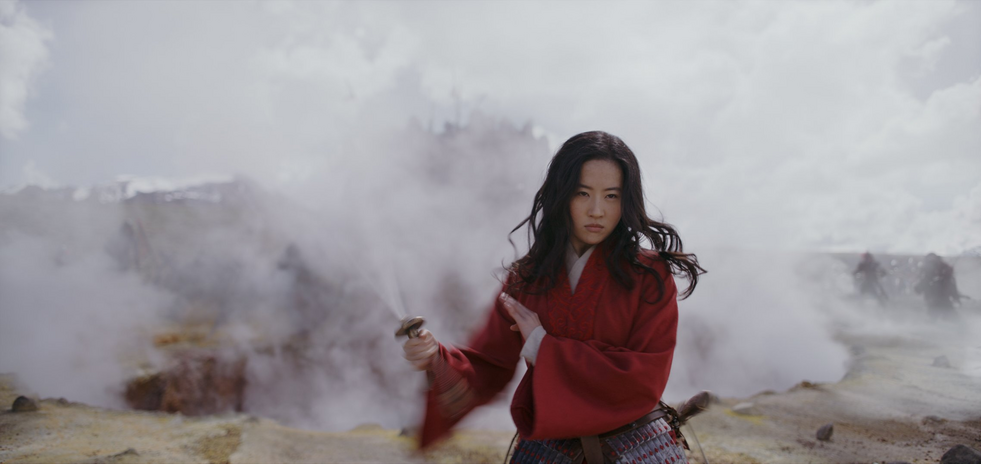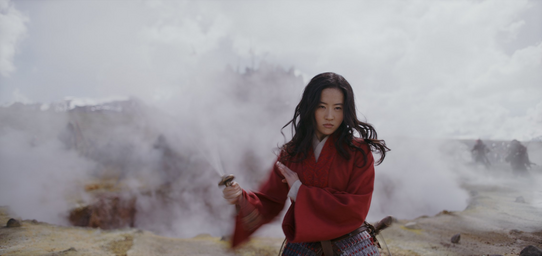“My father has no grown-up son
And I have no elder brother.
I’m willing to buy a horse and a saddle,
To go to battle in my father’s place”
This is an English translation of “The Ballad of Mulan” a 6th-century piece of folklore that has captured the hearts of generations upon generations. The ballad tells the story of a girl who goes to war in the place of her father. The traditional story of bravery has inspired countless adaptations; a 16th-century play (“Female Mulan Joins the Army Taking Her Father’s Place”), chapters in novels, and a television series. However, Disney’s 2020 live-action remake may be the most controversial retelling to date.
Disney had already tackled the tale of female empowerment in animated form in 1998. It was the first time Disney depicted a Chinese protagonist, although the Chinese audience criticised the characters for being too “foreign”. “Mulan” gave young girls a different kind of Disney princess, a young woman with a sense of humour.

Mulan’s love for her family, her bravery and battle skills were the main stories. The love story between Mulan and her love interest Captain Li Shang did not take precedence or take away from our female protagonist.
Mulan gave young girls a role model. Beauty was not everything. She then let modern princesses like Merida and Elsa take the reins. Gone were the days of Disney princesses waiting patiently for their male rescuers.

In 1994 artistic supervisors travelled to China to research the culture and to help make a film that would appeal to the Chinese market (a lucrative market for Disney). When the time came to make a live-action remake, Disney was more motivated than ever to appeal to audiences in China.
Aware of criticism of casting directors whitewashing stories in the past, Liu Yifei was hired for the role (already a household name in China). It would soon become the most expensive film to be directed by a woman with a budget of 200 million.
Although Covid19 restrictions forced this long anticipated production to be moved from the big screen to the lockdown essential that is Disney+, coronavirus was not this film’s biggest downfall. The name Mulan has become synonymous with controversy.
The first calls to #BoycottMulan came when lead actress Liu Yifei reshared an image from ‘People’s Daily’, the official paper of the Communist Party. The image was accompanied by a quote from Fu Guahao (a reporter for a state-owned tabloid). “I support Hong Kong Police”.
An Amnesty International report has condemned reports of police brutality against protestors in Hong Kong. Statements are backed up with photographic and video evidence. “The Hong Kong police’s heavy-handed crowd control response on the streets has been live streamed for the world to see. Much less visible is the plethora of police abuses against protestors that take place out of sight.”
A special tactical squad known locally as “raptors” are known for being the most violent. Protestors have been presented in hospitals with internal bleeding due to police beatings. The injustices do not end on the streets, with delayed access to medical care, torture, and intrusive, humiliating strip searches reported to take place in police stations.
Protestors are now demanding an independent enquiry into police brutality. Liu Yifei took a step back from the marketing campaign for the film. However, this was not the end of the political controversy surrounding the Disney adaptation.
Filming took place in Xinjiang, the location for so called ‘Vocational Education and Training Centres”. The Chinese government insists that these camps are voluntary while leaked documents suggested differently. The documents that were later dismissed as ‘fake news’ include instructions to run the camps as high-security prisons with no escape. Mandarin studies are a top priority and surveillance cameras are to have no blind spots. It is thought that over a million Uyghurs are detained in Xinjiang. Turkic-speaking Uyghurs are an ethnic minority.
Islam is an important part of their culture. Leaked documents suggest that detainees are allowed to be released when they have visibly transformed their beliefs, language, etc. The Uighur and Han populations in Xinjiang have a long history of conflict and tension. Violent clashes came to a front in 2009 when a violent outbreak led to 200 (mostly Han) deaths.
Stricter surveillance on largely Uighur areas ensued from other violent events such as the reported hijacking of a plane by six Uyghurs. Cameras, checkpoints, and non-stop police patrols became the norm in Uighur populated areas. July 2014, saw the Xinjiang government departments’ ban on fasting during Ramadan.
An Uyghur man exiled in Switzerland told the Human Rights Council that his family “is held hostage in a Chinese concentration camp.” The Chinese Ambassador to Ireland told Sarah McInerney that “a lot of the concerns in the US and UK have been exaggerated.” The very end of the credits of Mulan was a shock to even top Disney executives.
Disney includes special thanks to eight government entities in Xinjiang. Including the CPC Xinjiang Uighur Autonomy Region Committee.



